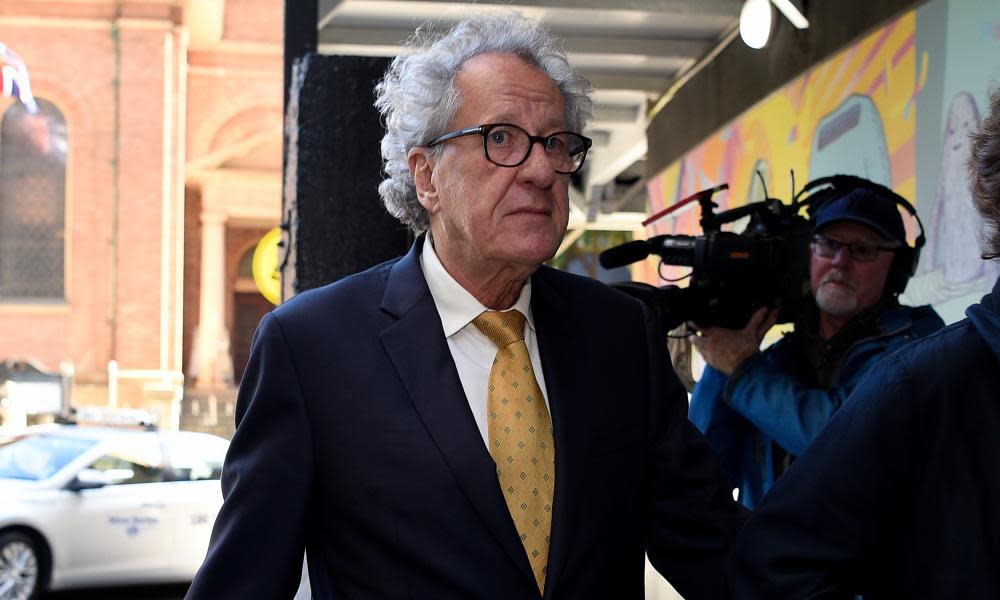Geoffrey Rush case: Daily Telegraph and Nationwide News lose defamation appeal against actor

The Sydney Daily Telegraph will have to pay the actor Geoffrey Rush a record $2.9m in damages after the tabloid lost its appeal against a historic defamation ruling.
The newspaper and its publisher, Nationwide News – part of Rupert Murdoch’s media empire, had challenged an Australian federal court decision from April 2019 that found claims conveyed in two of its news articles from 2017 that the Oscar winner had behaved inappropriately towards a colleague were not credible.
On Thursday the full court of the federal court upheld the 2019 ruling that the articles portrayed the actor as a sexual predator and “pervert” in detailing his behaviour towards a co-star during the 2015-16 run of the Sydney Theatre Company production of King Lear.
One of the Daily Telegraph articles the court found was defamatory included the headline “King Leer” below a picture of Rush.
While the original news report did not name the alleged victim, Eryn Jean Norvill, who played the role of Cordelia (the daughter of Rush’s King Lear), later gave evidence during the original defamation trial, telling the court Rush had deliberately touched her breast during a live performance without consent.
Rush has denied these claims.
Ben English, the editor of the Daily Telegraph, said he was “very disappointed” by Thursday’s decision, warning that the outcome of the original case and the appeal “exposes the inadequacies of Australia’s defamation laws and heightens the need for urgent legislative reform to enable public debate and to encourage women to come forward with their concerns”.
In addition to agreeing with the original judgment that all of the defamatory imputations claimed by Rush’s lawyers were conveyed by the news reports, and that the Daily Telegraph had failed to show that the allegations were true, Thursday’s appeal decision also found the damages and interest amount of $2,872,753 to be awarded to Rush had been an “optimistic” calculation, given “the ferocity, and the unrefined responses of the #MeToo movement”.
The amount, which considered how Rush’s tarnished reputation would limit future work for him, comprised “non-economic loss including aggravated damages” of $850,000, “past economic loss including pre judgement interest” of $1,060,773, “future economic loss” of $919,678 and “pre judgement interest on the non-economic loss” of $42,302.
While the Daily Telegraph had claimed these estimations were “manifestly excessive”, and disagreed that it would take two years after the original judgment of defamation before Rush’s “earning capacity” would be restored, the full court dismissed these claims.
Despite rejecting the appeal, justices Jacqueline Gleeson, Richard White and Michael Wheelahan did agree with elements of the Daily Telegraph’s appeal submission, notably that the justice who oversaw the original defamation trial, Michael Wigney, “attached significance to positive statements made” by Norvill about Rush in promotional interviews for King Lear.
Wigney had said the positive comments from Norvill, that Rush was “just forever playful” and “very cheeky”, undermined the evidence she gave as testimony of his inappropriate behaviour during the trial.
“In that context it would have been natural for Ms Norvill to make positive statements about performing with him, whatever her private feelings,” Thursday’s judgment said.
“In our view, Ms Norvill’s conduct in the interviews is equally consistent with the circumstance that the conduct she described had occurred but with her suppressing or subordinating her own personal feelings to the ‘corporate’ interest in promoting the performance of King Lear,” the justices wrote.
But they went on to note that “there was a good deal of other evidence ... which indicated that there was a positive relationship between” the two in the lead-up to the production, including from testimonies of other actors who gave evidence during the trial.
The justices also said they did not think Wigney had based his ultimate conclusion on Norvill’s comments made during the promotional interviews.
The appeal judges also agreed with Wigney’s decision to reject the Daily Telegraph’s request to include evidence from the actor Yael Stone during the original trial, who accused Rush of harassment while working on a different production.
English, who was not the editor of the Daily Telegraph when the articles were published in 2017, also said he had hoped the full court would “reverse Justice Wigney’s findings as to the credibility of Eryn Jean Norvill or reverse His Honour’s decision to exclude the testimony of Yael Stone”.
“We support both women in their decision to share their complaints,” English said.
“We will continue to report on the issues such as these which are of great concern to the Australian public. As stated by High Court Chief Justice Susan Kiefel last week, there is no place for sexual harassment in any workplace.”

 Yahoo Movies
Yahoo Movies 
